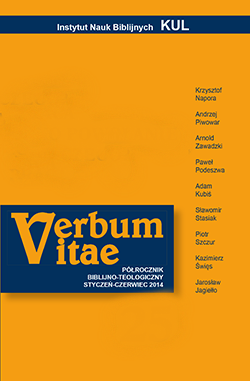Mądrościowe odczytanie przykazania: „Nie mów fałszywego świadectwa przeciw bliźniemu swemu” (Wj 20,16; Pwt 5,20) w Księdze Przysłów
The Sapiential Interpretation of the Commandment “You shall not bear false witness against your neighbour” (Ex 20:16; Dt 5:20) in the Book of Proverbs
Author(s): Andrzej DemitrówSubject(s): Christian Theology and Religion, Theology and Religion, Biblical studies, Systematic Theology, Pastoral Theology
Published by: Katolicki Uniwersytet Lubelski Jana Pawła II - Wydział Teologii
Keywords: Book of Proverbs; commandment; false witness; lying tongue; truthfulness;
Summary/Abstract: The commandments, in the context of biblical Israel, constituted a solid foundation for one’s relationship with both God and man, thus providing the basic element for the shaping of human society. In this regard, the commandment “You shall not bear false witness against your neighbour” gained particular significance. The very quantity and variety of social and moral situations led naturally to legal specifications, as confirmed by the code of laws in the Books of Exodus and Deuteronomy. Beyond this, equally important for the chosen people was the process of formation and education through accumulated sapiential maxims and proverbs which contributed to the formation of right attitudes. References to the need for bearing true witness and ipso facto warnings against bearing false witness appear frequently in the Book of Proverbs, and they serve to confirm the great educational role of this commandment in the sapiential thought of biblical Israel.
Journal: Verbum Vitae
- Issue Year: 2015
- Issue No: 28
- Page Range: 91-132
- Page Count: 42
- Language: Polish

